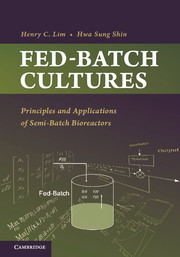Description
Fed-Batch Cultures
Principles and Applications of Semi-Batch Bioreactors
Cambridge Series in Chemical Engineering Series
Authors: Lim Henry C., Shin Hwa Sung
This first book dealing exclusively with every aspect of fed-batch operations, used in most industrially important fermentation and bioreactor operations.
Language: English
Subjects for Fed-Batch Cultures:
Publication date: 04-2013
471 p. · 18.2x26 cm · Hardback
471 p. · 18.2x26 cm · Hardback
Description
/li>Contents
/li>Biography
/li>
Many, if not most, industrially important fermentation and bioreactor operations are carried out in fed-batch mode, producing a wide variety of products. In spite of this, there is no single book that deals with fed-batch operations. This is the first book that presents all the necessary background material regarding the 'what, why and how' of optimal and sub-optimal fed-batch operations. Numerous examples are provided to illustrate the application of optimal fed-batch cultures. This unique book, by world experts with decades of research and industrial experience, is a must for researchers and industrial practitioners of fed-batch processes (modeling, control and optimization) in biotechnology, fermentation, food, pharmaceuticals and waste treatment industries.
1. Introduction to fed-batch bioreactors; 2. Idealised reactors and fed-batch reactors; 3. Maximisation of reaction rates and fed-batch operation; 4. Phenomena that favour fed-batch operations; 5. Classification and characteristics of fed-batch cultures; 6. Models based on mass balance equations; 7. Non-equation-based models; 8. Experimental determination of specific rates; 9. Optimization via Pontryagin's maximum principle; 10. Computational techniques; 11. Optimization of single and multiple isothermal reactions; 12. Optimization of fed-batch cultures for cell mass production; 13. Optimization of fed-batch cultures for metabolites; 14. Simple, intuitive adaptive optimization; 15. Measurements, estimation and control; 16. Feasibility assessment and implementable feed rates.
Dr Lim gained industrial experience by working for Pfizer for five years in areas of reaction engineering and separation and purification. He taught for twenty-one years at Purdue University and initiated biochemical engineering research in 1970. He was recruited to the University of California, Irvine, where he was founding chair of biochemical engineering and chemical engineering for ten years and taught for twenty-two years. He has extensive consulting experiences with Leeds and Northrup, Novo Enzyme Corporation, Pharmacontrol Inc., Eli Lilly, Merck, Monsanto, LG Biotech Inc., CJ Biotechnology and Zander Renewable Resources. He studied bioreactions and bioreactor engineering, modeling, optimization and control of bioreactors, cellular regulation, recombinant DNA technology and bioremediation. Dr Lim has supervised more than 50 PhD theses and published more than 160 journal articles and 2 books. He received the Food, Pharmaceutical and Bioengineering Division Award of the AIChE for his work on bioreactor and enzyme engineering.
Dr Shin received formal education at Postech (Korea) and the University of California, Irvine. After postdoctoral positions at Irvine and the University of Michigan, he joined the Biological Engineering Department of Inha University, where he is currently the chair of the department. He studies the optimization and control of fed-batch fermentation, control of stem cells and neurons in micro-fluidic cell culture systems, and application of optimization theory to stem cells and neural tissues in defined macro and micro environments.
Dr Shin received formal education at Postech (Korea) and the University of California, Irvine. After postdoctoral positions at Irvine and the University of Michigan, he joined the Biological Engineering Department of Inha University, where he is currently the chair of the department. He studies the optimization and control of fed-batch fermentation, control of stem cells and neurons in micro-fluidic cell culture systems, and application of optimization theory to stem cells and neural tissues in defined macro and micro environments.
© 2024 LAVOISIER S.A.S.




